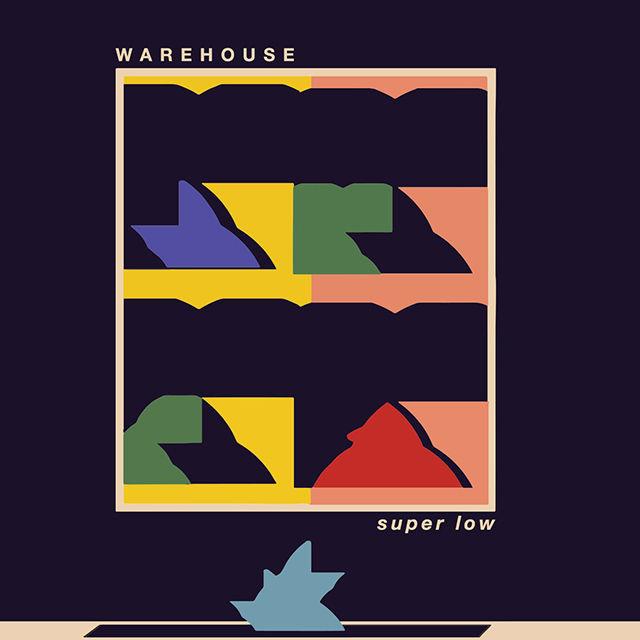Released on Friday, “Super Low” is more than just the ideal height for winning a game of limbo; it’s the sophomore album of the indie rock group Warehouse following their 2014 release of “Tesseract.” The album, which is soon to be making its way to your radio via WKNC, is titled after a strange convenience store/grocery mart across the street from the band’s apartments located in their hometown of Atlanta. Comprising members Ben Jackson and Alex Bailey, Josh Hughes, Doug Bleichner and Elaine Edenfield on guitars, bass, drums and vocals respectively, Warehouse stands out in a wave of garage rock and post-rock noise.
The most immediate feature of the album is Edenfield’s voice. Like a cross between classic alto female vocalists such as Beth Gibbons of Portishead and modern grunge screamers like Tina Halladay of Sheer Mag, Edenfield sports a unique set of pipes that go a long way in helping to define the band’s sound. She utilizes a heavy, gravelly and scratchy sound to carry her upper and mid range, while pulling from the diaphragm to create the smooth boom of her lower range. While this style is growing slightly more popular as the garage scene continues to develop, few are able to pull it off with both confidence and competence. Edenfield admirably does both.
The instrumentation provided by the rest of the band is not to be overlooked either. Standing apart from most bands within the same genre, Warehouse utilizes a low distortion approach to their guitar, with a primarily clean sound for the lead and a touch of grime for the rhythm. The main effects applied are tremolo, medium decay and a touch of phaser, resulting in a similar sound to the guitar effects in chillwave or surf-rock but with the backing power of garage rock stylings.
As for the riffs and solos themselves, while often overshadowed by the prominence of the vocals, the guitar on this album is equally enjoyable. Each song is very well-accented by the lead guitar, playing intricate melodic lines that both rival and compliment the vocals. One would be hard-pressed to say that the guitar on “Super Low” is boring or otherwise uninteresting, as can be said of many other bands’ guitarists in the same genre.
The drums and bass on the album are also easy to underappreciate. The rhythmic complexities of the drums may not be inherently obvious or revolutionary, but they add a tremendous amount of depth to the album. The role that a drummer plays in elevating a song from good to great is often much larger than expected. To make a song good at its core, there needs to be a baseline for the other instrumentalists to build off of, and that often comes down to the drums. Warehouse should find itself in luck that both its metaphorical and literal baseline are of such a high quality.
Indeed, Hughes’s bass playing is another elevating factor that deserves its own spotlight. His work on the album gives it not only backbone, but polish and finesse. It serves as a direct contrast to Edenfield’s vocals, going together like sugar and coffee; the sweet grit to the bitter flow. They work nicely in tandem, and together add yet another layer of depth to the album.
And to speak of the album’s style, it is a particular brand of garage rock that is both unique and enjoyable in its own right. The sound is rough, but not angry. Most bands in the garage rock subgenre are very aggressive, pushing their message with the furious sincerity of a mean drunk. In the case of bands like FIDLAR, that’s barely even a metaphor, as half of their songs revolve around intoxication and societal rebellion. In a subgenre where this attitude is the norm, “Super Low” boasts a sound that is deliberate, but not aggressive. This is to say nothing negative of either stylistic approach, simply that Warehouse has managed to find their own niche.
Of course, no album is perfect, and as should be expected there are a few things to nitpick about “Super Low.” For example, the album can occasionally fall into repetition, with several verses sounding very similar. This doesn’t necessarily detract from the experience, but it does hold back the album slightly. Furthermore, the prominence of the vocal aspect of the album draws attention to the occasionally odd lyrical content. While not lacking complexity, the lyrics do sometimes sound a bit clunky in song form. The album could benefit from some more work on lyrical flow in this regard.
All in all, however, “Super Low” is an incredibly charming and enjoyable piece of indie/garage rock, and deserves a chance from anyone looking for new music in this genre. For what few flaws it has, it easily stands out as being of both high quality and high uniqueness. It’s not perfect, but it’s pretty darn good. Fans of Sheer Mag or Hop Along should give “Super Low” by Warehouse a shot.








